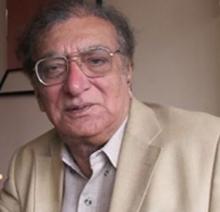Har Shaakh Chaman Ki Jal Rahi Hai Kiya Baad-e-Muraad Chal Rahi Hai,
Hum Hain Ke Faraib Kha Rahe Hain Duniya Hai Ke Chaal Chal Rahi Hai,
Yoon Dil Mein Hai Teri Yaad Jaise Weerane Mein Aag Jal Rahi Hai,
Rukh Pher Liya Hai Jab Se Tune Duniya Ki Nazar Badal Rahi Hai,
Dar Pesh Hai Aaj Bhi Wohi Surat-e-Haal Jo Soorat-e-Haal Kal Rahi Hai,
Itni Bhi “Faraz” Bad Dili Kiya ? Sambhlo ! Ke Fizaa Badal Rahi Hai

Ahmad Faraz, the name that resonates with poetry enthusiasts, stands as a towering figure in the realm of Urdu literature. Born as Syed Ahmad Shah in Kohat, British India, on January 12, 1931, Faraz became one of the most celebrated and beloved poets of his time. His profound words, rich metaphors, and poignant expressions captured the hearts and minds of countless readers, cementing his legacy as a master poet.
Faraz's poetry is characterized by its depth, intensity, and the ability to touch the deepest recesses of the human soul. His verses delve into themes of love, loss, longing, revolution, and social justice, reflecting the trials and tribulations of the society he lived in. Faraz possessed an uncanny talent for weaving together words that evoked strong emotions, often stirring a sense of longing, melancholy, or hope within his readers.
One of the distinctive aspects of Faraz's poetry is his mastery of the ghazal form. He revitalized this traditional poetic form, infusing it with his unique style and contemporary sensibilities. His ghazals are replete with captivating imagery, thought-provoking symbolism, and a lyrical quality that sets them apart. Faraz had an innate ability to capture the nuances of human relationships, particularly the bittersweet nature of love, with remarkable finesse.
Throughout his poetic journey, Faraz remained a voice of dissent and resistance. His verses became a powerful medium to criticize social and political injustices, and he fearlessly confronted the prevailing power structures of his time. He spoke for the downtrodden, the marginalized, and the voiceless, embodying the spirit of a true poet-activist.
Faraz's poetry not only resonated within the confines of his native Pakistan but transcended borders, touching the hearts of Urdu poetry enthusiasts worldwide. His words became an integral part of the cultural fabric, inspiring generations and leaving an indelible mark on the literary landscape.
Ahmad Faraz breathed his last on August 25, 2008, leaving behind a rich body of work that continues to inspire and captivate readers to this day. His verses remind us of the power of words, the beauty of language, and the profound impact that poetry can have on society.
In the realm of Urdu poetry, Ahmad Faraz's name shines like a radiant star, forever illuminating the hearts of those who seek solace, inspiration, and an unfiltered expression of the human experience. His legacy remains an eternal testament to the enduring power of poetry to touch the very core of our existence.
Raatain Hain Udaas, Din Karry hain Ay Dil Tere Honslay Baray Hain
Ay Yaad-e-Habib Sath Daina Kuch Marhalay Sakht Aa Paray hain
Rukna Ho Agar Tou So Bahaanay Jaana Ho Tou Rastay Baray Hain
Ab Kaisay Btayen Waja-e-Girya Jab Aap Bhi Saath Ro Pary Hain
Ab Jaanay Kahan Naseeb Lay Jaye Ghar Se Tou “FARAZ” Nikal Paray Hain
Phiray Ga TU Bhee Yun Hee Kuu-Ba-Kuu Hamari Tarah Dareedah Daaman-o-Aashafta Muu Hamari Tarah
Kubhi Tou Sang Se Phootay Gi Aabajuu Gham Ki Kubhi Tou Toot Ke Roye Ga TU Bhee Hamari Tarah
Palat Ke Tujh Ko Bhee Aana Hai Is Taraf Laikin Lutaa Ke Qaafila-e-Rang-o-Buu Hamari Tarah
Wo Laakh Dushman-e-Jaan Ho Magar Khuda Na Karay Ke Os Ka Haal Bhee Ho Huu-Ba-Huu Hamari Tarah
Hum Hee “Faraz” Sazawaar-e-Sang Kiun Tehray ? Ke Aur Bhee Tou Hain Dewaana-e-Khuu Hamari Tarah
Mein tujhe kho ke bhi zinda hoon, Yeh dekha tu ne, Kiss qadar hauslaa haarey huye insaan mein hai..
Shab-e-Firaaq Tou Kat’ti Nazar Nahi Aati, Khayaal-e-Yaar Mein Aao Faraz So Jayein…!
Zahid sharab peene de masjid mein beth kar,
Yaa woh jagha bata jahan Khuda nahin..
(Mirza Ghalib)
Masjid khuda ka ghar hai, peeney ki jagha nahin,
Kaafir ke dil mein ja, Wahan khudaa nahin..
(Allama Iqbal)
Kaafir ke dil se aya hon mein yeh dekh kar,
Khuda maujood hai wahan, Par usey pata nahin..
(Ahmad Faraz)
Hui Hai Shaam Tou aankhon mein Bas Gayaa Phir tu, kahaan gayaa hai mere shahar ke musaafir tu,
Bohat Udaas Hai Ik ShaKhs Tere Jaane Se, Jo Ho Sake Tou Chalaa aa Usii Kii Khaatir tu,
Merii Misaal Ke Ik NaKhl-e-Khushk-e-Saharaa Huu.N Teraa Khayaal Ke ShaaKh-e-Chaman Kaa Taa_ir tu,
Mai.n Jaantaa Huu.N Ke Duniyaa Tujhe Badal Degii Mai.n Maanataa Huun Ke aisaa Nahii.n Bazaahir tu,
Ha.Nsii Khushii Se bichhar Jaa agar BichhaDnaa hai Ye Har Maqaam Pe Kyaa Sochtaa Hai aaKhir tu,?
‘Faraz’ Tune Use Mushkilon Mein Daal Diyaa Zamaanaa Saahib-e-Zar aur Sirf Shaayar tu..
Tota tu ho magar abhi bikhra ny faraz mery badan pay jesy shikaston ka jaal ho
Yeh dil ka chor ke is ki zaroortain theen bohat, Wagarna tark-e-taluq ki soortain theen bohat,
Miley to toot roye na khul ke batain keen, Ke jese ab dilon mein Kudurtain theen bohat,
Bula diye hain tere gham ne dukh zamane ke, Khuda nahin tha tou pathar ki moortain theen bohat,
Dareeda peerhano ka khayal kya ata, Ameer sheher ki apni zarooratain theen bohat,
Faraz dil ko nigahon se ikhtlaaf raha, Wagarna sheher mein hum-shakal soortain theen bohat.
(Chor:Something Fishy)(Tark-e-Taluq:Boycott)(Moortain:Idols)(Ikhtlaaf:Not Agreeing)
Qurbaton me bhi judai ke zamaane maange, Dil woh be-mehr ke rone ke bahane maange,
Hum na hote to kisi aur ke charche hote, Halqat-e-shehr to kehne ko fasaane maange,
Yehi dil tha ke tarassta tha maraasim ke liye, Ab yehi tark-e-talluq ke bahaane maange,
Apna yeh haal ke jee haar chuke lutt bhi chuke, Aur mohabbat wohi andaaz puraane maange,
Zindagi hum tere daaghon se rahe sharminda, Aur tu hai ke sadaaa aayina-khaane maange,
Dil kisi haal pe qaane hi nahin jaane faraz, Mil gaye tum bhi to kya aur na jaane maange..
